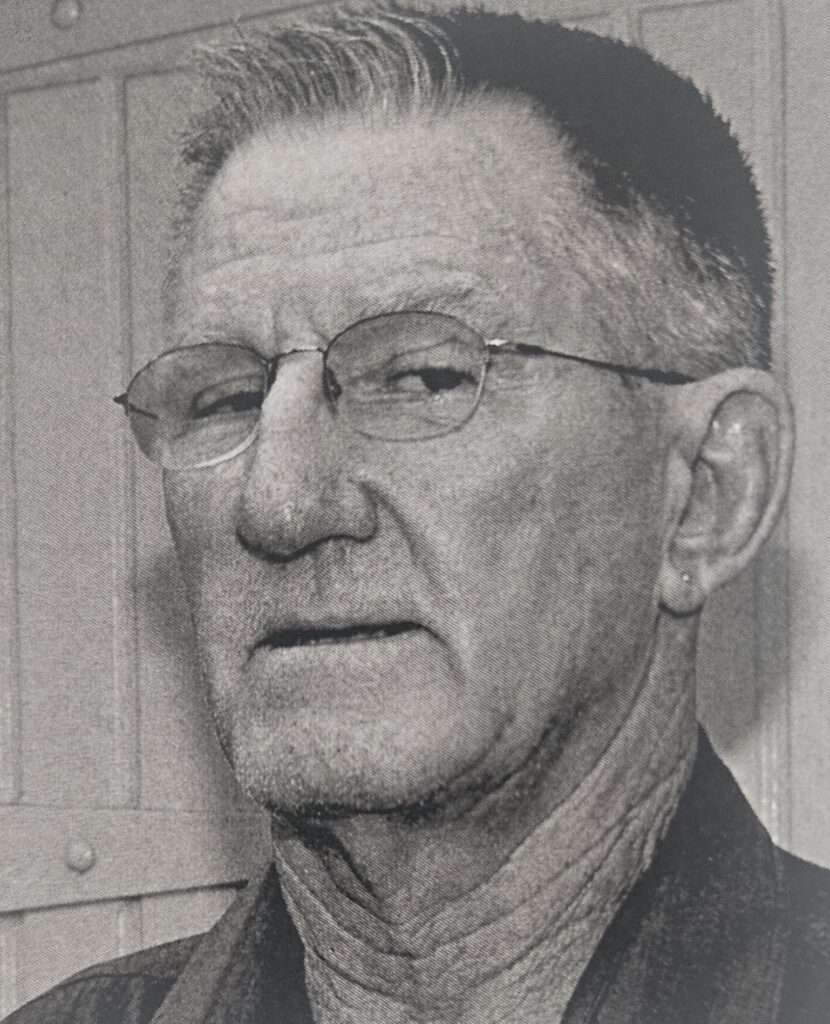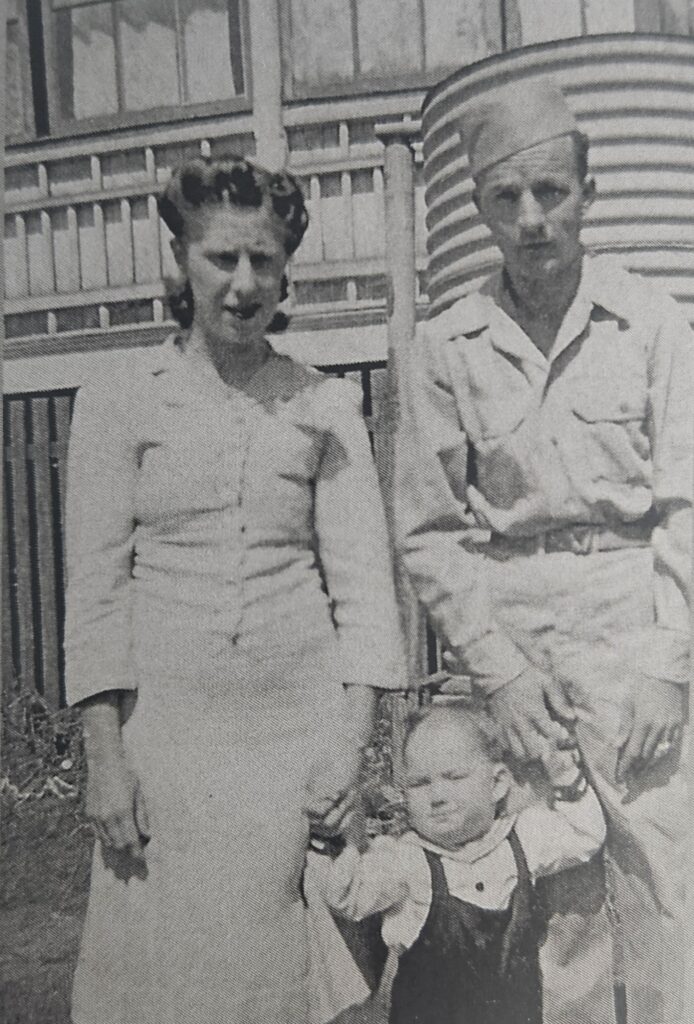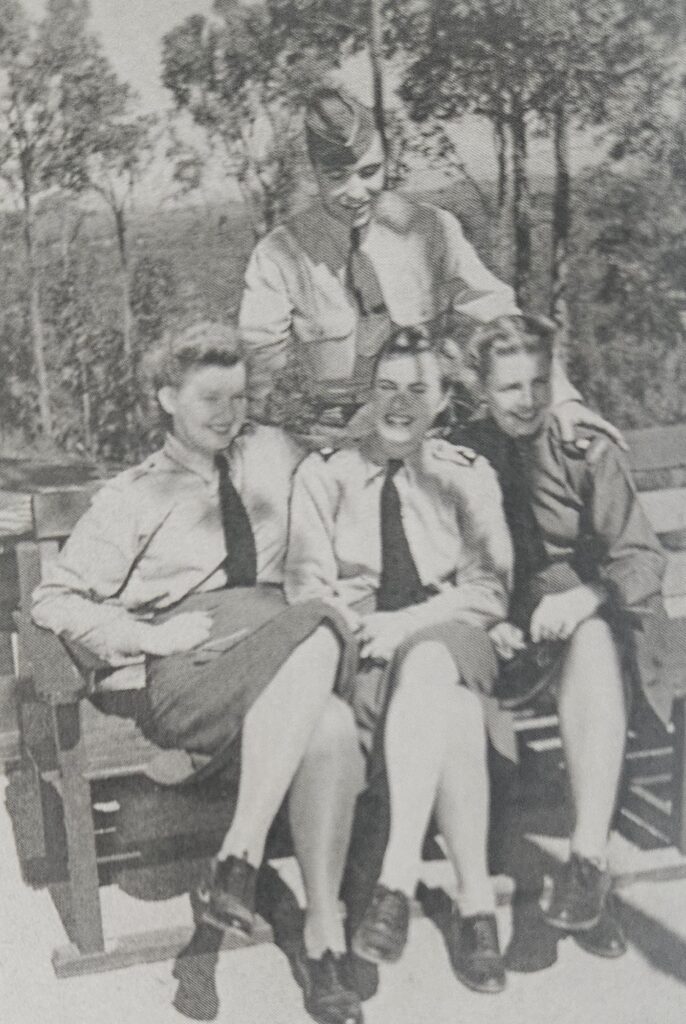
During WWII, my father was in a Transport battalion and was based out near Darra-Wacol somewhere. He was on the road every day, driving down to the wharves to pick up incoming goods, and bringing them out this way to be stored-in igloos I was told, though I’m not sure where.
My father was a private in the US Army, L V Hubbard, born 14 August 1922 in Arkansas. (His birth certificate adds (“JO”) – Initials Only: there was no actual name – and this was apparently a custom for a time in those parts).
Infantry troops passed through Brisbane for a short time, en route to or from the war zones. But soldiers in transport and supply units were often based in Brisbane for several years and had time to build a relationship.

My mother was working as an usherette in the Regent theatre in Queen Street when they met and started courting. Doris Simpson was a Hendra girl, born on 5 November 1920; her father was a builder and painter. She also worked in a local fish and chip shop for a time.
I was born at RBH in 1943, and my mother named me after film stars Dennis Morgan and Richard Green (Robin Hood).
My parents were married on 22 August 1944, at the Methodist church in Albert St, Brisbane, and since LV was still in barracks, Mum and I continued to live apart.
My sister was born in 1945 and was also named after entertainers – Sybil Francis and James Arness (Gunsmoke).
Buderim
My grandparents had four daughters and were concerned about them -especially in relation to American soldiers. Their eldest daughter had a soldier baby in 1942 but was pressured to adopt her out (we only found Lynette in 1995). Then I was born out of wedlock.
In 1940 my grandparents had moved to a farm at Buderim, but Mum stayed in Brisbane. Later, we went up there too. My father and other soldiers rode their motor bikes up from Brisbane on the weekends. The US also ran bus trips for men on R&R up to Alexander Headland and other local spots.
We grew ginger for the Buderim Ginger Factory, and also strawberries, mangoes, guavas, beans etc. The crops would be taken by horse and dray to the COD warehouse in Buderim. The co-op would then take all local farm produce by truck to the markets in Brisbane.
The family joined the government program offering home hospitality to visiting American soldiers. Some weekends there were up to ten men staying at the farm, in their own tents or in hammocks strung up under the house.
To the United States
And then the war was over, and the soldiers had to go back home. My father’s battalion left in late 1945, I think.
In 1947, my mother followed with us, aged two and four. I think the US Consul helped organise the trip. We arrived in Desha county to find what my mother had begun to suspect: my father had another wife and two children. He had committed bigamy!
It took a bit of sorting out, but his parents – and his wife – helped organise an annulment and a settlement. So, we stayed in Desha for a time. But my father was not in our lives from that point.
Then Mum met and married Leonard Harold Hughes Snr. He happily adopted us, and in a few years, we had two stepbrothers to complete our family. My stepfather was a Marine, so we moved around a lot in Arkansas, California and Kentucky.
In 1948 he was posted to Guam, and we all moved with him. I remember not long after we arrived, there was a typhoon. It was loud and dark and scary, with no power, crouching under the table. Afterwards there were just four steel igloos left in our camp – and a few native huts that the wind could whistle right through.

We went back to school – and Sunday school – in an old bowling alley. I remember one day I went exploring behind in the works, and I couldn’t get out. And they couldn’t get me out from the front: I had to find my way the full length of the alley through the intricate machinery.
And I was also in trouble on the military bus to and from school. The supervisors were always telling me to “sit with your sister” or “not there.” It was only years later that I realised that, though they never said so, they didn’t want me to sit with the black kids.
Dad was posted to Korea with the Marines, so the family was taken back to Barstow, California, where we lived adjoining the base for two years. One day a big Army car pulled up outside our house, and two big officers got out. Mum was crying before they got to our gate.
Dad was killed in 1951 in Korea, and the family paid to have his body brought back to his hometown of Benham, Kentucky. Mum received his Purple Heart (Killed in Action), which I have – and my brother has the American flag it was presented in.
In 1952, Mum decided to bring our family home to Buderim. Travelling with four young children was hard, and at a stopover in Hawaii the local paper took a photo – I still have the article. A little while later she was still struggling with the young ones when a man asked, “Can I help you ma’am?” and held one brother while Mum dealt with the other. It was film star Cary Grant – and Mum always regretted that the cameraman had gone by then.
Back in Australia
So, we grew up in Buderim, going to local schools – and with Aboriginal and Islander and immigrant children all barefoot in the playground together.
Planning for the future, we three brothers decided to form a team, and we all took on an apprenticeship – one each as a builder, a painter and an electrician.
But mine fell through, and when I couldn’t find another, I eventually joined the Army.
I was in the Army for twenty-one years – in the 4th Battalion-and did tours in Malaya, Borneo and Vietnam. I joined a military band – I was in the drum corps (20 drums and bugles) and formed an R&B band on the side. I married; and I have a son.
Since I got out in 1983, I have lived in Brisbane’s south-west – just as my father did during the war. I have worked largely in security and am still a licensed Private Investigator and JP. I joined Lions, and now I volunteer for St John’s. And since retiring, I have formed a band called “The Gentlemen in Black” with four other locals. We are now known in the area and enjoy entertaining at local functions and venues.
The search
But my greatest interest now is to find my father, dead or alive. We have tried several avenues, and have birth and marriage certificates etc. But I want to meet him – or those who knew him.
In 1999, we came across an internet appeal – it must have been from his brother-“looking for “Dot” Hughes and nephew and niece Dennis and Sybil.” But it had disappeared when we went back, and we can only guess what prompted the posting.
We now have a list of nearly twenty LV Hubbards who live in Arkansas, and we will gradually ring them all. Maybe my aunt in the States can help find numbers.
I have the money put aside – and my sister will be coming with me.
And the day we find him, or his sons or descendants-we will be off to the States!
At 63, my greatest wish is to find my father.
